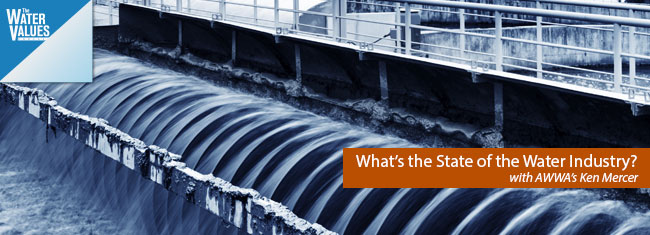Podcast: Play in new window | Download
Subscribe: Apple Podcasts | Android | RSS
Ken Mercer, the American Water Works Association’s (AWWA) Senior Manager of Technical and Research Programs, comes on The Water Values Podcast to discuss the AWWA’s State of the Water Industry Survey. Ken does a deep dive into how those in the water industry perceive the industry from a variety of perspectives. Check this episode out and see how the industry thinks it’s doing! And if you’re not participating in the AWWA’s surveys, you need to start!
In this Session, You’ll Learn about:
- The basics of the AWWA’s State of the Water Industry Survey (Survey)
- Who participates in responding to the Survey
- What the most important water industry issues are
- Trends in the importance of certain water issues
- Thoughts on why certain issues have risen or fallen in prominence over the past few Surveys
- Whether utilities think they will be able to recover their costs in the future
- The importance of public education in promoting the water industry and its services
Resources and Links Mentioned in or Relevant to this Session Include:
- American Water Works Association (AWWA)
- AWWA State of the Water Industry Survey
- The Utility Management Conference
- Journal of The American Water Works Association
- Water Infrastructure Finance and Innovation Act (WIFIA)
- Water Resource Reform and Development Act
- A Ditch in Time: The City, the West and Water by Patricia Nelson Limerick
- DC Water
- AWWA Resource Communities
Transcript
Click here to download the Transcript for Session 23 of The Water Values Podcast.
Thank You!
Thanks to each of you for listening and spreading the word about The Water Values Podcast! Keep the emails coming and please rate and review The Water Values Podcast on iTunes and Stitcher if you haven’t done so already. And don’t forget to tell your friends about the podcast and whatever you do, don’t forget to join The Water Values mailing list!

Let me start by saying that I think the AWWA is a great organization. The State of the Water Industry Survey, however, seems statistically flawed, based on Ken’s responses to Dave’s questions. The number of responses seems way too low to be considered a representative sample. And the fact that the sample is not random, but based on voluntary responses means that the results are based on utilities that can devote the time to completing the survey. A better approach might be for the AWWA to identify a representative cross section of the utilities, and then to pay those utilities to complete the survey each year. Another shortcoming seems to be the changing wording of the survey from year to year. They should hone the questions and then not change them significantly from year to year.
Regarding the 2014 SOTWI Survey, after removing wholly incomplete responses (i.e., surveys submitted with no responses at all), the total number of respondents completing a majority of the survey was 1,739. Approximately 53% of respondents (922) indicated they worked for a utility, while 47% (817) were not directly employed by a utility. Because the response rate was relatively low (based on estimates of the water industry population) and the amount of self-selection bias is unknown, no estimates of error are calculated.
Because of the approach used in the study, voluntary response bias comes from both nonresponse (respondents differ in meaningful ways from non-respondents) and undercoverage (members of the population are inadequately represented in the sample). As with every organization, AWWA does what it can given the constraints of a normal (although exceptional) nonprofit, but suggestions for improvements are duly noted.
Regarding wording changes from year to year, several of the questions are kept the same, but as our understanding of the issues improves or as new issues are identified, the survey questions change or are added accordingly to explore them further. At the end of the day, the survey is meant primarily to provide a snapshot of current and future water industry concerns, and I think it accomplishes that and whole lot more. Cheers!
I can fully appreciate the difficulty in trying to conduct a meaningful survey of the utilities supported by the AWWA, either through membership or through the publication of so many excellent documents, periodicals, and texts. My comments were meant only as constructive criticism and nothing more. Cheers back!